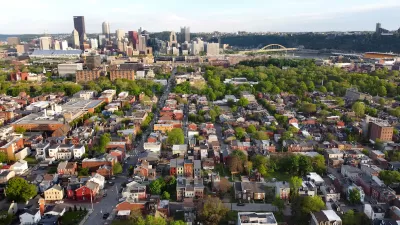Conservative opponents of Smart Growth often decry the role of government in establishing the regulations and investments that incentivize it. But, as Bradley Heard points out, all development rights, smart or sprawling, depend on big government.
Taking as his jumping off point a recent white paper from the conservative Heritage Foundation that lambastes the anti-market and anti-civil liberty policies of smart growth, Heard actually finds agreement with their core argument. "It's true that smart growth regulations infringe on the market," he says.
"But," he continues, "that's true of all development regulations—and of property rights themselves. By design, all property regulations constrain individuals' freedom of choice to decide how to acquire and use property. It's also true that pushing one form of development over another infringes on the market in a different and greater way than simply guaranteeing property ownership. But this too is a necessary evil of all development regulations."
Echoing President Obama's infamous jibe that "you didn't build that," Heard points out that critics of smart growth based on the principle that government intrusion upon the free market is objectionable are missing the big picture. "You can't build one of those suburban subdivisions—or even one of those fancy new mixed-use 'town centers' in the center of nowhere—unless the government blesses, builds, and maintains the roads, schools, sewers, and utilities to serve it."
"Meanwhile, smart growth requires a lot less government infrastructure than sprawl," argues Heard. "It also results in huge savings to taxpayers. By making communities walkable and bikeable, and locating them close to mass transit, smart growth reduces commutes, conserves important environmental resources, and facilitates more healthy lifestyles. And yes, as with suburban sprawl, smart growth also requires big government."
"Whether the Heritage Foundation and the Tea Party care to admit it or not, it's always been the case that individual property owners can only use property in accordance with the regulations set by the government. The right and responsibility to determine how land is used belongs to the government, for the benefit of the people as a whole, and it always has. That's necessary for modern civilization."
FULL STORY: All development rights depend on big government

Planetizen Federal Action Tracker
A weekly monitor of how Trump’s orders and actions are impacting planners and planning in America.

Congressman Proposes Bill to Rename DC Metro “Trump Train”
The Make Autorail Great Again Act would withhold federal funding to the system until the Washington Metropolitan Area Transit Authority (WMATA), rebrands as the Washington Metropolitan Authority for Greater Access (WMAGA).

The Simple Legislative Tool Transforming Vacant Downtowns
In California, Michigan and Georgia, an easy win is bringing dollars — and delight — back to city centers.

The States Losing Rural Delivery Rooms at an Alarming Pace
In some states, as few as 9% of rural hospitals still deliver babies. As a result, rising pre-term births, no adequate pre-term care and harrowing close calls are a growing reality.

The Small South Asian Republic Going all in on EVs
Thanks to one simple policy change less than five years ago, 65% of new cars in this Himalayan country are now electric.

DC Backpedals on Bike Lane Protection, Swaps Barriers for Paint
Citing aesthetic concerns, the city is removing the concrete barriers and flexposts that once separated Arizona Avenue cyclists from motor vehicles.
Urban Design for Planners 1: Software Tools
This six-course series explores essential urban design concepts using open source software and equips planners with the tools they need to participate fully in the urban design process.
Planning for Universal Design
Learn the tools for implementing Universal Design in planning regulations.
Smith Gee Studio
City of Charlotte
City of Camden Redevelopment Agency
City of Astoria
Transportation Research & Education Center (TREC) at Portland State University
US High Speed Rail Association
City of Camden Redevelopment Agency
Municipality of Princeton (NJ)





























